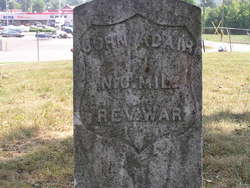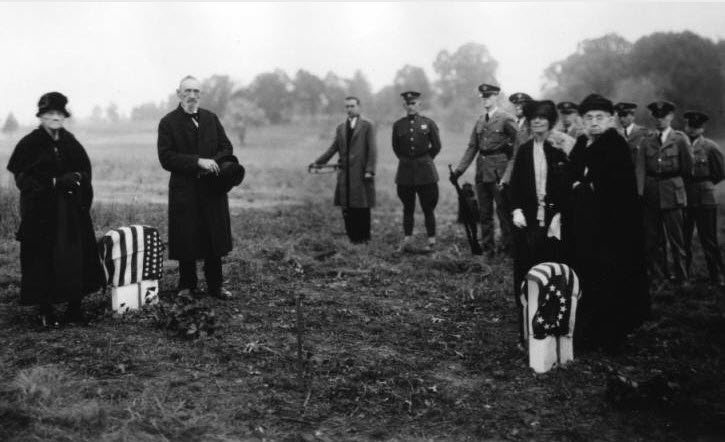The story of John Adair was the quintessential American immigrant story. He was born circa 1732 in Ireland. He married his wife, Eleanor Crawford in 1752. The Daughters of the American Revolution documented they had at least two children: son, John, and daughter, Mary, who married Robert Christian, son of Major Gilbert Christian, one of the Heroes who fought at the Battle of King's Mountain. (Reference Lyman C. Draper's 1881 tome, "King's Mountain and Its Heroes," page 417.)
John Adair, Jr. documented the country of birth of his parents when he applied for Revolutionary War Pension. In has application, S1158, he testified he "was born in Ireland in the County of Antrim in the year 1754. His Father with him & the family came to America and landed at Baltimore, the year he cannot state with certainty, but it was when he was a youth, perhaps not quite 18 years old. His Father lived in Maryland a little upwards of a year. He then moved to Pennsylvania and stayed there something like 12 months. His Father then moved with the family to Sullivan County then in North Carolina but now in Tennessee where he (the applicant) lived when the War of the Revolution commenced."
As evidenced by historical events, John Adair, Sr. was a learned man with trustworthy values. In 1779, Richard Caswell, the Governor of North Carolina appointed him as "Entry Taker." This position collected and held the fees garnered from Land Grants. His appointment had a significant impact on American history.
In August of 1780, Lord Cornwallis, emboldened by the defeat of General Gates at the Battle of Camden, South Carolina in June, planned to travel from the besieged Charleston, SC, through South and North Carolina, join Major Patrick Ferguson and his recruits, with the goal of invading Virginia.
As Ferguson escorted his troops, he was engaged in a skirmish with troops led by brothers, Colonel Charles McDowell and Major Joseph McDowell. The McDowells were forced to disperse. The brothers took refuge at the Watauga Settlement.
Colonel Isaac Shelby chose his trusted friend, John Adair, as a messenger to Colonel William Campbell "to inform him of the progress of Ferguson, and the retreat of McDowell'svcorps ; and also to inquire whether it would be prudent to make an effort to enable the exiles to recross the mountains, and return to their own homes." [Reference Lyman C. Draper, "King's Mountain and Its Heroes," Page 528.}
Draper added that Campbell sent a reply via Adair that " if the western counties of North Carolina would raise a force to join Col. McDowell's men, that the officers of Washington County would co-operate to aid their friends to return home." {Reference Draper.}
Draper continued on Page 174:
"Colonel Sevier endeavored to borrow money on his
private responsibility, to fit out his men for this distant
service — for there were a few traders in the countrj- who
had small supplies of goods. What little money the people
had saved, had been expended to the last dollar to the
Entr)' Taker of Sullivan County, John Adair, the State
officer, for the sate of the North Carolina lands — the same
person, doubtless, whom Colonel Shelby had sent as his
express to Colonel Arthur Campbell. Sevier waited upon
him, and suggested that the public money in his possession
be advanced to meet the military exigencies at this critical
juncture. His reply was worthy of the. man and the times :
"Colonel Sevier," said he, " I have no authority by law to
make that disposition of this money; it belongs to the
impoverished treasury of North Carolina, and I dare not
appropriate a cent of it to any purpose ; but, if the country is
over-run b}^ the British, our liberty is gone. Let the money
go, too. Take it. If the enemy, by its use, is driven from
the country, I can trust that country to justify and vindicate
my conduct — so take it."* Thus between twelve and thirteen
thousand dollars were obtained, ammunition and necessary
equipments secured. Colonels Sevier and Shelby pledging
themselves to see the loan refunded or legalized by an act
of the Legislature, which they effected at the earliest prac-
ticable moment."
{Note: This historic episode was full of adventure and daring, bravery, and prescient thought by forward thinking men. Draper had unprecedented access to the men involved. I cannot do justice to the events: please read his 1881 tome, "King's Mountain and Its Heroes," which can be accessed online.]
After the Revolution was fought and won, Adair continued to play an important role in the development of Tennessee as a state. Highlights include:
1792: Elected a Commissioner of Knoxville, Tennessee when General James White founded the City of Knoxville.
1794: Elected a Trustee of Blunt College which morphed into the University of Tennessee.
1796: Member first County Court of Knox County, Tennessee.
1796: Presidential Elector for Hamilton District.
1796: Elected member of Constitutional Convention which formed the first Constitution of Tennessee.
John Adair, Jr. and his wife, Mary, had at least two daughters. Mary and Barbara married brothers, Garner and Robert Parmley. (Mary first married David Bell.) The brothers were the sons of John Parmley, one of the Heroes who fought at the Battle of King's Mountain. (Reference Find A Grave Memorial# 27602282,)
Note: Many men named John Adair lived in the Colonies. Careful scrutiny must be used in examining documentation in establishing lineage. John Adair, Jr., the son of this Patriot was documented by the DAR: Senior was designated Ancestor A00358 and Junior, A000359. John Adair, Jr., identified his father in his Application for Revolutionary War Pension. Reference, also, Page 325 of Adair : history and genealogy
Chapter XLIII. Hon. John Adair of Knoxville, and Adair family genealogy : an accounting of our South Carolina-Indiana-Idaho Adair ancestry. Succinctly, John Adair, Jr. (1754 - 1843) was the proven son of this man.
The story of John Adair was the quintessential American immigrant story. He was born circa 1732 in Ireland. He married his wife, Eleanor Crawford in 1752. The Daughters of the American Revolution documented they had at least two children: son, John, and daughter, Mary, who married Robert Christian, son of Major Gilbert Christian, one of the Heroes who fought at the Battle of King's Mountain. (Reference Lyman C. Draper's 1881 tome, "King's Mountain and Its Heroes," page 417.)
John Adair, Jr. documented the country of birth of his parents when he applied for Revolutionary War Pension. In has application, S1158, he testified he "was born in Ireland in the County of Antrim in the year 1754. His Father with him & the family came to America and landed at Baltimore, the year he cannot state with certainty, but it was when he was a youth, perhaps not quite 18 years old. His Father lived in Maryland a little upwards of a year. He then moved to Pennsylvania and stayed there something like 12 months. His Father then moved with the family to Sullivan County then in North Carolina but now in Tennessee where he (the applicant) lived when the War of the Revolution commenced."
As evidenced by historical events, John Adair, Sr. was a learned man with trustworthy values. In 1779, Richard Caswell, the Governor of North Carolina appointed him as "Entry Taker." This position collected and held the fees garnered from Land Grants. His appointment had a significant impact on American history.
In August of 1780, Lord Cornwallis, emboldened by the defeat of General Gates at the Battle of Camden, South Carolina in June, planned to travel from the besieged Charleston, SC, through South and North Carolina, join Major Patrick Ferguson and his recruits, with the goal of invading Virginia.
As Ferguson escorted his troops, he was engaged in a skirmish with troops led by brothers, Colonel Charles McDowell and Major Joseph McDowell. The McDowells were forced to disperse. The brothers took refuge at the Watauga Settlement.
Colonel Isaac Shelby chose his trusted friend, John Adair, as a messenger to Colonel William Campbell "to inform him of the progress of Ferguson, and the retreat of McDowell'svcorps ; and also to inquire whether it would be prudent to make an effort to enable the exiles to recross the mountains, and return to their own homes." [Reference Lyman C. Draper, "King's Mountain and Its Heroes," Page 528.}
Draper added that Campbell sent a reply via Adair that " if the western counties of North Carolina would raise a force to join Col. McDowell's men, that the officers of Washington County would co-operate to aid their friends to return home." {Reference Draper.}
Draper continued on Page 174:
"Colonel Sevier endeavored to borrow money on his
private responsibility, to fit out his men for this distant
service — for there were a few traders in the countrj- who
had small supplies of goods. What little money the people
had saved, had been expended to the last dollar to the
Entr)' Taker of Sullivan County, John Adair, the State
officer, for the sate of the North Carolina lands — the same
person, doubtless, whom Colonel Shelby had sent as his
express to Colonel Arthur Campbell. Sevier waited upon
him, and suggested that the public money in his possession
be advanced to meet the military exigencies at this critical
juncture. His reply was worthy of the. man and the times :
"Colonel Sevier," said he, " I have no authority by law to
make that disposition of this money; it belongs to the
impoverished treasury of North Carolina, and I dare not
appropriate a cent of it to any purpose ; but, if the country is
over-run b}^ the British, our liberty is gone. Let the money
go, too. Take it. If the enemy, by its use, is driven from
the country, I can trust that country to justify and vindicate
my conduct — so take it."* Thus between twelve and thirteen
thousand dollars were obtained, ammunition and necessary
equipments secured. Colonels Sevier and Shelby pledging
themselves to see the loan refunded or legalized by an act
of the Legislature, which they effected at the earliest prac-
ticable moment."
{Note: This historic episode was full of adventure and daring, bravery, and prescient thought by forward thinking men. Draper had unprecedented access to the men involved. I cannot do justice to the events: please read his 1881 tome, "King's Mountain and Its Heroes," which can be accessed online.]
After the Revolution was fought and won, Adair continued to play an important role in the development of Tennessee as a state. Highlights include:
1792: Elected a Commissioner of Knoxville, Tennessee when General James White founded the City of Knoxville.
1794: Elected a Trustee of Blunt College which morphed into the University of Tennessee.
1796: Member first County Court of Knox County, Tennessee.
1796: Presidential Elector for Hamilton District.
1796: Elected member of Constitutional Convention which formed the first Constitution of Tennessee.
John Adair, Jr. and his wife, Mary, had at least two daughters. Mary and Barbara married brothers, Garner and Robert Parmley. (Mary first married David Bell.) The brothers were the sons of John Parmley, one of the Heroes who fought at the Battle of King's Mountain. (Reference Find A Grave Memorial# 27602282,)
Note: Many men named John Adair lived in the Colonies. Careful scrutiny must be used in examining documentation in establishing lineage. John Adair, Jr., the son of this Patriot was documented by the DAR: Senior was designated Ancestor A00358 and Junior, A000359. John Adair, Jr., identified his father in his Application for Revolutionary War Pension. Reference, also, Page 325 of Adair : history and genealogy
Chapter XLIII. Hon. John Adair of Knoxville, and Adair family genealogy : an accounting of our South Carolina-Indiana-Idaho Adair ancestry. Succinctly, John Adair, Jr. (1754 - 1843) was the proven son of this man.
Family Members
Advertisement
Records on Ancestry
Sponsored by Ancestry
Advertisement



